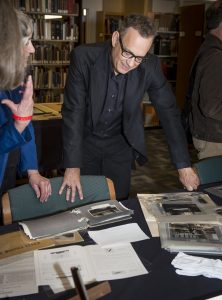Contributed by Timothy R. Gaffney, National Aviation Heritage Alliance
Pulitzer Prize-winning author David McCullough returned to Wright State University just as actor-filmmaker Tom Hanks was making his campus visit, joining him to examine artifacts that are part of the university’s Wright Brothers Collection.
In nearly five years of research for his bestselling book The Wright Brothers, McCullough came to know the brothers Wilbur and Orville Wright more closely than he knew his closest friends.
He did it by being a snoop.
In a distinguished career of writing historical narratives such as Truman, John Adams—both of which earned him the Pulitzer Prize for biography—and, last year, The Wright Brothers, McCullough was able to play Peeping Tom on some of the great figures of history, he told a master class at Wright State on April 19.
“I’ve been keeping company with a lot of impressive people in my years writing books, and if you spend three, four, five, as many as 10 years with someone you never knew and has long passed from the scene, you get to know that person very well in many ways, better than you know people in real life. Because in real life you don’t get to read other people’s mail,” he said.
Fortunately for historians and writers like McCullough, the Wright brothers were talented and prolific writers.
“The letters the Wright brothers wrote in private correspondence, within the family almost entirely, number over a thousand in the Library of Congress. And none of them—none of the four, the father (Bishop Milton Wright); the sister, Katharine; and the two brothers—were capable of writing a short letter or a boring one. They were absolutely superbly written. We can go into their lives in a way that we can’t normally,” McCullough told the class.
Many more papers survive in the Wright State University Libraries’ Special Collections and Archives. McCullough frequented both collections in his research.
Born and raised in Pittsburgh and now living in Boston, McCullough returned to Wright State and connected with Hanks, who was dedicating the Tom Hanks Center for Motion Pictures and taking part in a fundraising gala for the university’s Rise. Shine. campaign.
During their visit to campus, Hanks and McCullough toured the archives and examined rare Wright artifacts that are part of the Wright Brothers Collection, one of the most complete collections of Wright material in the world. The collection includes the Wrights’ own technical and personal library, family papers, and other documents detailing the lives and work of Wilbur and Orville Wright and the Wright family.
In his master class, McCullough, who holds a degree in English literature from Yale University, made a case for the humanities and used the Wright brothers as evidence.
“One of the joys of my work on the Wright brothers was to realize that these two men, who cracked one of the most difficult, if not the most difficult problems of all time, had only an education in the humanities. And they got it at home,” he said.
The Wright family letters are important in helping us know Wilbur and Orville not only for what they did, but who they were, McCullough said. And understanding how individuals change history requires understanding how they live, he added.
“I think the Wright brothers are a lesson in history if ever there was,” McCullough said—not just in their invention of the airplane, “but how they went about their pursuit of purpose and the dedication they brought to their work, and the fact that they did not let failure defeat them. They could get knocked down, and they did in many ways, but they always got back up again, and they always learned from their mistakes or their failures.”
At the close of the 19th century, Wilbur and Orville began attacking the problem of flight, and by the end of 1903 they made the first controlled, powered flight in a heavier-than-air machine. By the end of 1909 they were selling airplanes in the United States and Europe, and by the end of 1910 they had erected the first American factory for airplane manufacturing.
McCullough used the Wright brothers to underscore how individuals can change history and why it’s important to know them.
“They changed the world. Changed history. Who were they? And how many times have we been flying at 35, 40,000 feet at 500, 600 miles an hour thinking nothing of it?” he asked rhetorically. “Who did it, and why in the world aren’t they better known, and why weren’t we told more about them, and what kind of people they were, and what kind of values they had, and what we can learn from them by not just what they accomplished, but how they conducted themselves in life and in their community?”



 Wright State names Rajneesh Suri dean of Raj Soin College of Business
Wright State names Rajneesh Suri dean of Raj Soin College of Business  ‘Only in New York,’ born at Wright State
‘Only in New York,’ born at Wright State  Wright State president, Horizon League leaders welcome new commissioner
Wright State president, Horizon League leaders welcome new commissioner  Wright State celebrates homecoming with week-long block party
Wright State celebrates homecoming with week-long block party  Wright State baseball to take on Dayton Flyers at Day Air Ballpark April 15
Wright State baseball to take on Dayton Flyers at Day Air Ballpark April 15 